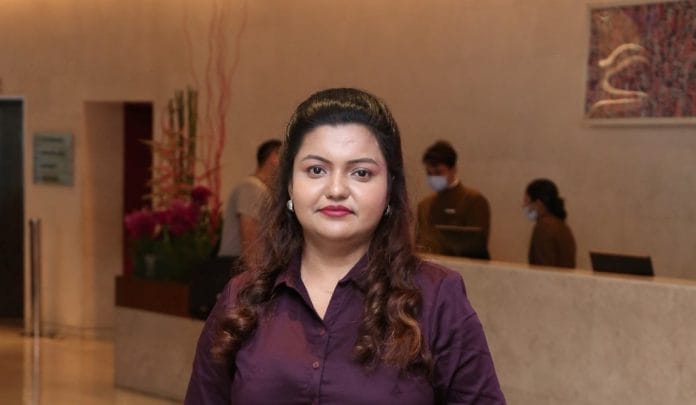New Delhi: In Nagaland, a tribal community named ‘Jesumi’ practises a tradition of “hacking their old mother to death and then eating her flesh to keep her at peace as they believe that a mother who brings a child into the world through her womb must end up in the same way like the newborn” — this disturbing narration is an excerpt from a now-deleted Facebook post, written by Bengali writer Debarati Mukhopadhyay, on 18 August about her short story, ‘Bhoj’.
The “fictional” story — first published in the Bengali magazine Nabakallol in 2017 and later compiled into a collection of short stories, Debaratir Sera Thiller — has now roiled several Naga people on Twitter and Facebook, with many criticising the depiction as ‘racist’.

Mukhopadhyay, who is also a West Bengal Civil Service officer, told ThePrint that many people have “misunderstood” the post — written in Bengali — and are spreading “false allegations” against her.
Defending her work, the author said, “‘Bhoj’ is a short story that was written in 2017. The story is based on two friends, an imaginary tribe in an imaginary location… I didn’t use any real name or customs. Moreover, it’s complete fiction. A disclaimer was also mentioned.”
“There are numerous web series/ movies/ books based in [real] locations. A murder in Rajasthan doesn’t imply defamation of Rajastan,” she added.
According to Mukhopadhyay, some Nagas on social media are being misled into thinking that ‘Jesumi’ — which is a fictional Bengali word — refers to Chizami, a town in Nagaland. She clarified that there is no relation between the two.
The small town of Chizami is located amid the densely forested hills of Phek district, dominated by the Chakhesang tribe.
In another Facebook post Monday, Mukhopadhyay tendered an apology for hurting the people of Nagaland “completely unintentionally” and said that the word ‘Nagaland’ would be changed to a fictional name in the next edition.
“I had a talk with the publisher — they will change the name ‘Nagaland’ to some fictional name in the next edition. I won’t take responsibility for any other’s opinion,” she wrote in her post.
‘Gaslighting Naga people’
Many Twitter users criticised Mukhopadhyay for allegedly portraying Naga people as “cannibals” in her story, and expressed their outrage at the “defaming” of the community. Some also called her a “racist”.
“Note the tone of racist superiority and gaslighting Naga people for objecting to such portrayal,” Naga scholar Dolly Kikon wrote in her tweet.
The stereotype of Naga people as cannibals. Note the tone of racist superiority and gaslighting Naga people for objecting to such portrayal. Comparing Nagaland and Kolkata to justify fiction writing,and the author's love for Naga culture is giving me headache. @Author_debarati https://t.co/4iH2JrM8Yc
— Dolly Kikon (@DollyKikon) October 3, 2022
Senior journalist Nitin Sethi said racism wrapped in “packaging paper or words is still as crude and as rotten”.
Racism. Wrapped in any packaging paper or words is still as crude and as rotten. The stench easy to smell. https://t.co/PlrGrsN8zk
— Nitin Sethi (@nit_set) October 3, 2022
A user suggested that Mukhopadhyay should not have used the word “Nagaland” in her story if the story was imaginary.
Is she sure about what she's writing? Or did she suddenly wake up one day and decided to write from imagination? I wonder how people become writers with such poor research. ?If she made it up, then did she give a disclaimer? Also, she needn't have used Nagaland to say her story.
— Tinat (@SIANG16) October 3, 2022
Disgusting, unacceptable and sickening.
— Tongam Rina (@tongamrina) October 3, 2022
Mukhopadhyay, however, said the whole narrative had been blown out of proportion as people could not get the “full translation” of the story.
“They are feeling I’ve defamed them. There’s no question of defaming,” she emphasised.
Unverified ‘folklore’
Elaborating on the inspiration for her thriller short story, Mukhopadhyay said an old labourer (a non-Naga person), who she had met five years ago in Nagaland, told her about the “strange practice”.
“The practice was carried out by a tribe that believed in the conservation of soul. As we come through a mother’s womb into the world, after her death, they consume the mother so that her soul can live within the person. It’s fiction and folklore. I wrote the concept using imaginary details,” she said.
Furthermore, Mukhopadhyay said the old man had told her that the ritual was “abolished before the 70s’”, but she couldn’t verify the folklore with a Naga person.
“I was a young author back then and didn’t realise this would stir such an issue after five years. I have evolved in these years and become more mature,” the author added.
Also read: Words, phrases don’t mean the same – Why peace talks with the Nagas have been stuck






